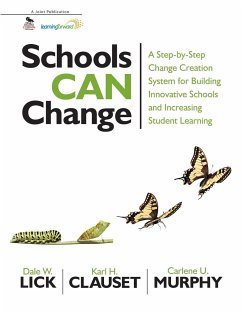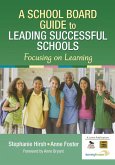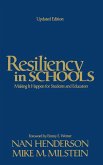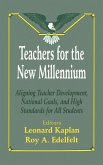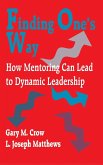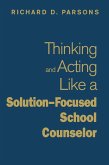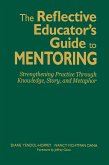Schools Can Change
A Step-by-Step Change Creation System for Building Innovative Schools and Increasing Student Learning
Schools Can Change
A Step-by-Step Change Creation System for Building Innovative Schools and Increasing Student Learning
- Broschiertes Buch
- Merkliste
- Auf die Merkliste
- Bewerten Bewerten
- Teilen
- Produkt teilen
- Produkterinnerung
- Produkterinnerung
Build a dynamic system for change! From NCLB to Common Core standards, we are inundated with directives for improving our schools. How can we really create lasting change? By applying the Change Creation system! Learning community pioneers Dale Lick, Karl Clauset, and Carlene Murphy lead teachers, principals, and schools in this dynamic approach to school improvement. With a free, comprehensive online collection of practical resources, this book shows you how to: Develop the right vision, relationships, and culture to create and sustain change Model learning-inquiry cycles for action teams for…mehr
![A School Board Guide to Leading Successful Schools A School Board Guide to Leading Successful Schools]() Stephanie HirshA School Board Guide to Leading Successful Schools40,99 €
Stephanie HirshA School Board Guide to Leading Successful Schools40,99 €![Inclusion Coaching for Collaborative Schools Inclusion Coaching for Collaborative Schools]() Toby J. KartenInclusion Coaching for Collaborative Schools40,99 €
Toby J. KartenInclusion Coaching for Collaborative Schools40,99 €![Resiliency in Schools Resiliency in Schools]() Nan HendersonResiliency in Schools72,99 €
Nan HendersonResiliency in Schools72,99 €![Teachers for the New Millennium Teachers for the New Millennium]() Leonard KaplanTeachers for the New Millennium72,99 €
Leonard KaplanTeachers for the New Millennium72,99 €![Finding One's Way Finding One's Way]() Gary M. CrowFinding One's Way67,99 €
Gary M. CrowFinding One's Way67,99 €![Thinking and Acting Like a Solution-Focused School Counselor Thinking and Acting Like a Solution-Focused School Counselor]() Richard D. ParsonsThinking and Acting Like a Solution-Focused School Counselor78,99 €
Richard D. ParsonsThinking and Acting Like a Solution-Focused School Counselor78,99 €![The Reflective Educator's Guide to Mentoring The Reflective Educator's Guide to Mentoring]() Diane Yendol-HoppeyThe Reflective Educator's Guide to Mentoring78,99 €
Diane Yendol-HoppeyThe Reflective Educator's Guide to Mentoring78,99 €-
-
-
Hinweis: Dieser Artikel kann nur an eine deutsche Lieferadresse ausgeliefert werden.
- Produktdetails
- Verlag: Corwin
- Seitenzahl: 256
- Erscheinungstermin: 26. November 2012
- Englisch
- Abmessung: 280mm x 216mm x 14mm
- Gewicht: 654g
- ISBN-13: 9781412998741
- ISBN-10: 1412998743
- Artikelnr.: 36272424
- Herstellerkennzeichnung
- Books on Demand GmbH
- In de Tarpen 42
- 22848 Norderstedt
- info@bod.de
- 040 53433511
- Verlag: Corwin
- Seitenzahl: 256
- Erscheinungstermin: 26. November 2012
- Englisch
- Abmessung: 280mm x 216mm x 14mm
- Gewicht: 654g
- ISBN-13: 9781412998741
- ISBN-10: 1412998743
- Artikelnr.: 36272424
- Herstellerkennzeichnung
- Books on Demand GmbH
- In de Tarpen 42
- 22848 Norderstedt
- info@bod.de
- 040 53433511
Online Resources
Foreword
Preface
Purpose and Need
Who Should Read and Use This Book?
Organization and Contents
Acknowledgments
About the Authors
1. The Change Creation System
School Improvement
School Reforms
The Roots of the Change Creation System
No Silver Bullet, One Brick at a Time
Standards for Professional Learning and Practice
The Change Creation System
Summary
Part I. Fundamentals of Effectiveness
2. Fundamentals of Effectiveness for School Improvement
Understanding the Culture
Culture of Discipline
Culture of Change Creation
Culture of Relationships and Collaboration
Culture of Transformational Leadership
Cultural Change
Summary
3. Fundamentals of Vision and Successful Change
Vision
Change
Success and Failure of Change
Effective Sponsorship in Schools
Change and Resistance in Schools
Universal Change Principle for Schools
Summary
4. Fundamentals for Creating Learning Teams and Professional Learning
Communities
Collaboration and Teamwork
Action Teams and Professional Learning Communities
Authentic Teams and Synergy
Comentoring Teams
Learning Teams
Professional Learning Communities
Summary
Part II. The Process of the Change Creation System
5. Introducing the Decision-Making Cycle
Action Teams Decision-Making Cycle
Preparing to Start the Decision-Making Cycle
Summary
6. Identifying Student Learning Needs and Forming Action Teams
Student Learning Needs That Action Teams Address
How to Identify Student Learning Needs
Form Action Teams and Select Student Needs to Address
Selecting Student Needs to Address
Support for Identifying Student Needs and Forming Action Teams
Summary
7. Introducing Action Teams
Action Teams in the Change Creation System
The Work of Action Teams
Purposes of Action Teams
Action Team Principles
Action Team Process Guidelines
Effective Action Team Meetings
Action Teams as a Bundle of Changes
Summary
8. Support for Action Teams
Keep the Focus on Student Learning
Protect Time for Action Team Meetings
Establish Routines
Provide Regular, Frequent, and Constructive Feedback to Action Teams
Understand the Developmental Stages of Action Teams
Help Struggling Teams Move Forward
Develop Communication Networks and Strategies to Share Action Teams¿ Work
and Results
Form Administrator Action Teams
Summary
9. Creating Team Action Plans
Team Action Plan
Creating Team Action Plans
Support for Action Teams on Their Team Action Plans and Logs
Summary
10. Implementing Learning and Inquiry Cycles for Innovation and Improving
Student Learning: Parts 1 and 2
Implementing Learning and Inquiry Cycles
Supporting Learning and Inquiry Cycles for Innovation and Student Learning
Summary
11. Implementing Learning and Inquiry Cycles for Innovation and Improving
Student Learning: Parts 3 and 4
Implementing Learning and Inquiry Cycles
Supporting Learning and Inquiry Cycles for Innovation and Student Learning
Summary
12. Assessing the Impact of Action Teams and Sharing Results and Best
Practices
Assessing the Impact of Action Teams on Teacher Practice and Student
Learning
Sharing Results and Best Practices and Applying Lessons Learned
Repeating the Decision-Making Cycle Each Year
Supporting Assessing the Impact of Action Teams and Sharing Results and
Best Practices
Summary
Epilogue
References
Index
Online Resources
Foreword
Preface
Purpose and Need
Who Should Read and Use This Book?
Organization and Contents
Acknowledgments
About the Authors
1. The Change Creation System
School Improvement
School Reforms
The Roots of the Change Creation System
No Silver Bullet, One Brick at a Time
Standards for Professional Learning and Practice
The Change Creation System
Summary
Part I. Fundamentals of Effectiveness
2. Fundamentals of Effectiveness for School Improvement
Understanding the Culture
Culture of Discipline
Culture of Change Creation
Culture of Relationships and Collaboration
Culture of Transformational Leadership
Cultural Change
Summary
3. Fundamentals of Vision and Successful Change
Vision
Change
Success and Failure of Change
Effective Sponsorship in Schools
Change and Resistance in Schools
Universal Change Principle for Schools
Summary
4. Fundamentals for Creating Learning Teams and Professional Learning
Communities
Collaboration and Teamwork
Action Teams and Professional Learning Communities
Authentic Teams and Synergy
Comentoring Teams
Learning Teams
Professional Learning Communities
Summary
Part II. The Process of the Change Creation System
5. Introducing the Decision-Making Cycle
Action Teams Decision-Making Cycle
Preparing to Start the Decision-Making Cycle
Summary
6. Identifying Student Learning Needs and Forming Action Teams
Student Learning Needs That Action Teams Address
How to Identify Student Learning Needs
Form Action Teams and Select Student Needs to Address
Selecting Student Needs to Address
Support for Identifying Student Needs and Forming Action Teams
Summary
7. Introducing Action Teams
Action Teams in the Change Creation System
The Work of Action Teams
Purposes of Action Teams
Action Team Principles
Action Team Process Guidelines
Effective Action Team Meetings
Action Teams as a Bundle of Changes
Summary
8. Support for Action Teams
Keep the Focus on Student Learning
Protect Time for Action Team Meetings
Establish Routines
Provide Regular, Frequent, and Constructive Feedback to Action Teams
Understand the Developmental Stages of Action Teams
Help Struggling Teams Move Forward
Develop Communication Networks and Strategies to Share Action Teams¿ Work
and Results
Form Administrator Action Teams
Summary
9. Creating Team Action Plans
Team Action Plan
Creating Team Action Plans
Support for Action Teams on Their Team Action Plans and Logs
Summary
10. Implementing Learning and Inquiry Cycles for Innovation and Improving
Student Learning: Parts 1 and 2
Implementing Learning and Inquiry Cycles
Supporting Learning and Inquiry Cycles for Innovation and Student Learning
Summary
11. Implementing Learning and Inquiry Cycles for Innovation and Improving
Student Learning: Parts 3 and 4
Implementing Learning and Inquiry Cycles
Supporting Learning and Inquiry Cycles for Innovation and Student Learning
Summary
12. Assessing the Impact of Action Teams and Sharing Results and Best
Practices
Assessing the Impact of Action Teams on Teacher Practice and Student
Learning
Sharing Results and Best Practices and Applying Lessons Learned
Repeating the Decision-Making Cycle Each Year
Supporting Assessing the Impact of Action Teams and Sharing Results and
Best Practices
Summary
Epilogue
References
Index

